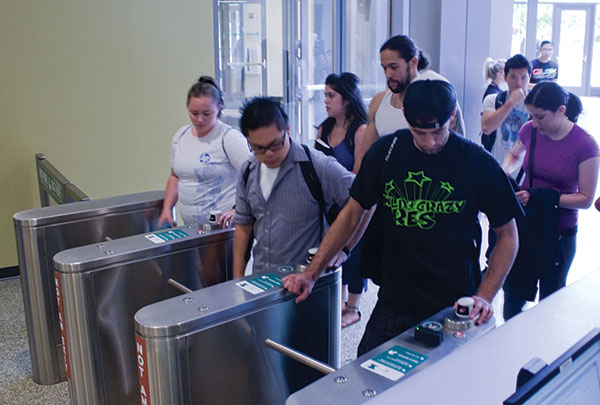Finger scanner raises concerns

Finger scans at The Well :Sacramento State students use the finger-scanning turnstiles to enter The Well.:Rachel Lotz – State Hornet
September 28, 2010
The biometric fingerprint scanners used at the entrance of The Well had students and faculty members voicing concerns about the facility’s emphasis on security.
But Assistant Director of Facilities and Informal Recreation Marc Falkenstein said there is nothing to be concerned about.
“It actually takes a scan of the dimensions of you finger and then it also takes a scan of the veins within your finger,” Falkenstein said. “It has nothing to do with what people are misconceiving as “their fingerprint’ and the police access to a fingerprint and criminal background checks.”
Just as the tread of tires help a car grip the road, human fingers have ridges and valleys that allow them to grip objects. Biometric fingerprint systems read those ridges and valleys and store them in a computer database. This is the system used by The Well to verify membership.
Falkenstein said the purpose of installing the biometric system was for the convenience of students.
“Where are you going to put the OneCard when you work out?” he said.
However, for Sacramento State alumnus Assad Hafeez, that emphasis on security has gone too far.
“It is a breach of privacy,” said Hafeez, who graduated with a bachelor’s degree in government. “With fingerprint scans, there is now more information being asked than before, which is done without any real need.”
Hafeez said he is also concerned with the possibility of identity theft, saying that fingerprinting is reserved for criminals and is verification to gain access to high-level security.
Criminal justice professor Dan Okada said students have valid reasons to worry about the security measure.
“In our collective state of technological encroachment we should all be legitimately weary of providing personal identifiers blithely and without first assessing the need,” he said. “We should all relax our vigilance a bit and give the university a break believing that the contracted confidentiality provider will be beyond reproach.”
However, students are not required to submit a finger scan, and students can still use their OneCard to gain access.
The 24-Hour Fitness chain and several universities nationwide, including San Diego State, use the same system as The Well’s.
Complaints similar to Hafeez’s regarding 24-Hour Fitness’ scanner were sent to the nonprofit Privacy Rights Clearing House as far back as 2006.
But Hafeez’s concerns began when he attended The Well’s grand opening ceremony on Sept. 2. He was told that he would have to pay a $10 entrance fee, leave his driver’s license at the front desk, and know someone who was already a member in order to gain access to the facility.
Hafeez said he was “somewhat upset.” He was then told he must fill out a liability waiver, which is to protect Sac State from a lawsuit in the case of an injury, and have his fingerprint taken.
“On the grand open day, the door was open and anyone could come in,” Falkenstein said. “It sounds like he came after the building was open for business and at that point is when you’d have to have a membership to gain access to the building.”
Under current regulations, alumni, who recently graduated must either sign up for a membership or pay $10 every time they visit The Well. However, there is a plan, now under development, that would allow recent graduates to tour the facility for free, Falkenstein said.
Mike Suechting can be reached at [email protected].
























































































































